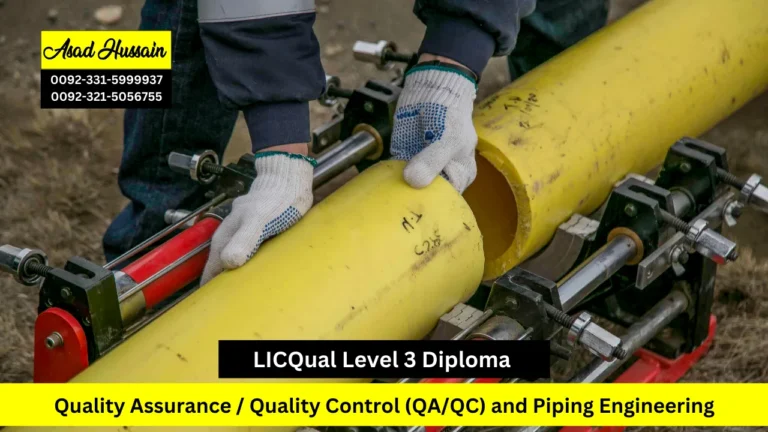The ICTQual Level 6 Diploma in Biotechnology Engineering is a higher-level qualification designed for individuals who aspire to work at the forefront of biotechnology and engineering. The diploma is structured to provide a thorough understanding of biological systems, engineering principles, and the integration of these two fields to develop technological solutions. It focuses on both theoretical knowledge and practical skills, ensuring students gain hands-on experience and are well-prepared for real-world challenges.
The ICTQual Level 6 Diploma in Biotechnology Engineering is an excellent choice for those who want to excel in the fields of biotechnology and engineering. With a well-rounded curriculum, practical experience, and a focus on cutting-edge technologies, this diploma provides students with the skills and knowledge needed to thrive in a rapidly evolving sector. Whether you aim to contribute to innovative medical treatments, sustainable agricultural practices, or advanced bioengineering solutions, this program equips you with the tools to make a meaningful impact.
In today’s fast-paced technological landscape, industries are seeking individuals who can bridge the gap between engineering, technology, and biological sciences. The ICTQual Level 6 Diploma in Biotechnology Engineering offers an advanced academic pathway that combines the best of biotechnology and engineering, preparing students for leadership roles in an array of sectors, including healthcare, pharmaceuticals, and environmental science.
Program Highlights
Year 1: Foundations of Biotechnology Engineering
- Introduction to Biotechnology
- Principles of Molecular Biology
- Basics of Biochemistry
- Fundamentals of Microbiology
- Introduction to Genetics and Genomics
- Principles of Cell Biology
- Mathematics for Biotechnology
- Fundamentals of Biostatistics
- Introduction to Engineering in Biotechnology
- Analytical Techniques in Biotechnology
- Basics of Bioinformatics
- Environmental Science and Sustainability
Year 2: Intermediate Biotechnology Concepts
- Bioprocess Engineering and Design
- Applied Microbiology and Industrial Applications
- Recombinant DNA Technology
- Biomaterials and Nanotechnology
- Immunology and Vaccine Development
- Protein Engineering and Enzyme Technology
- Bioinformatics Tools and Applications
- Environmental Biotechnology and Waste Management
- Bioreactors and Fermentation Technology
- Biomedical Engineering Basics
- Advanced Biostatistics and Data Analysis
- Ethical and Regulatory Aspects of Biotechnology
Year 3: Advanced Topics and Specialization
- Genetic Engineering and Genomic Editing
- Advanced Bioprocess Engineering
- Biotechnology Research Methods
- Pharmaceutical Biotechnology and Drug Development
- Systems Biology and Computational Modeling
- Agricultural Biotechnology and GMOs
- Industrial Biotechnology and Bioeconomy
- Synthetic Biology Applications
- Advanced Environmental Biotechnology
- Innovation and Entrepreneurship in Biotechnology
- Biotechnology Project Management
- Final Year Research Project
To apply for the ICTQual Level 6 Diploma in Biotechnology Engineering (360 Credits – 3 Years), candidates must meet the following entry requirements:
- Minimum Age: Applicants must be at least 18 years old.
- Academic Qualifications: A Level 5 qualification (or equivalent) in a related field such as science, biotechnology, engineering, or a technical discipline. This includes a Level 5 Diploma, HND, or similar qualifications.
- Subject Background: A strong foundation in subjects such as molecular biology, chemistry, biochemistry, or physics is recommended to ensure a solid understanding of advanced biotechnology concepts.
- Scientific Aptitude: While prior experience in biotechnology engineering is not required, applicants should demonstrate strong analytical and problem-solving skills in scientific contexts.
- English Proficiency: Non-native English speakers may need to provide proof of English language proficiency, such as an IELTS score of at least 6.0 or a TOEFL equivalent, to fully engage with the course material.
Learning Outcomes for the Level 6 Diploma in Biotechnology Engineering (360 Credits – Three Years)
Year 1: Foundations of Biotechnology Engineering
- Introduction to Biotechnology
- Understand the scope, applications, and impact of biotechnology across various industries.
- Identify key concepts and terminology in biotechnology.
- Principles of Molecular Biology
- Comprehend the structure, function, and replication mechanisms of DNA and RNA.
- Analyze the molecular mechanisms of gene expression and regulation.
- Basics of Biochemistry
- Identify the structure and function of biomolecules such as proteins, lipids, carbohydrates, and nucleic acids.
- Understand the principles of metabolic pathways and enzyme activity.
- Fundamentals of Microbiology
- Describe microbial diversity, classification, and cellular structures.
- Apply basic microbiological techniques for culturing and identifying microorganisms.
- Introduction to Genetics and Genomics
- Understand Mendelian inheritance and genetic variation.
- Explain genome organization and the role of genomics in modern biology.
- Principles of Cell Biology
- Describe cell structure, function, and communication mechanisms.
- Analyze the cell cycle processes and cellular responses to environmental stimuli.
- Mathematics for Biotechnology
- Apply mathematical principles to solve problems related to biotechnology.
- Use mathematical models for data interpretation in biological systems.
- Fundamentals of Biostatistics
- Perform basic statistical analyses relevant to biotechnology research.
- Interpret experimental data using statistical tools and techniques.
- Introduction to Engineering in Biotechnology
- Understand the application of engineering principles in biotechnology processes.
- Explain the role of biotechnology in industrial applications.
- Analytical Techniques in Biotechnology
- Demonstrate knowledge of spectroscopic, chromatographic, and imaging techniques.
- Apply these techniques to analyze biological samples.
- Basics of Bioinformatics
- Utilize bioinformatics tools for DNA, RNA, and protein sequence analysis.
- Understand data mining and computational approaches in biotechnology.
- Environmental Science and Sustainability
- Explain the role of biotechnology in environmental conservation.
- Understand sustainable practices in waste management and resource utilization.
Year 2: Intermediate Biotechnology Concepts
- Bioprocess Engineering and Design
- Understand bioprocess development and scale-up principles.
- Design and optimize biotechnological processes for industrial applications.
- Applied Microbiology and Industrial Applications
- Apply microbial biotechnology to industries like food, pharmaceuticals, and agriculture.
- Analyze the role of microorganisms in biotechnological innovations.
- Recombinant DNA Technology
- Perform basic techniques for DNA cloning, transformation, and expression.
- Understand the applications of recombinant DNA in research and industry.
- Biomaterials and Nanotechnology
- Describe the properties and applications of biomaterials in biotechnology.
- Understand the role of nanotechnology in drug delivery and diagnostics.
- Immunology and Vaccine Development
- Explain the components and functions of the immune system.
- Understand vaccine production and the development of immunotherapeutics.
- Protein Engineering and Enzyme Technology
- Analyze protein structure-function relationships.
- Apply techniques to engineer enzymes for industrial applications.
- Bioinformatics Tools and Applications
- Use advanced bioinformatics tools for genome annotation and functional analysis.
- Apply computational biology to solve biotechnological problems.
- Environmental Biotechnology and Waste Management
- Understand biotechnological approaches to environmental restoration.
- Analyze strategies for bio-based waste recycling and pollution control.
- Bioreactors and Fermentation Technology
- Understand the operation and design of bioreactors.
- Optimize fermentation processes for large-scale production.
- Biomedical Engineering Basics
- Understand the integration of biotechnology and engineering in medical applications.
- Analyze the role of biomedical devices and technologies.
- Advanced Biostatistics and Data Analysis
- Apply advanced statistical methods to analyze complex datasets.
- Use biostatistical software to interpret research findings.
- Ethical and Regulatory Aspects of Biotechnology
- Understand ethical considerations in biotechnology research and applications.
- Analyze global regulatory frameworks governing biotechnology practices.
Year 3: Advanced Topics and Specialization
- Genetic Engineering and Genomic Editing
- Apply advanced techniques like CRISPR for genome editing.
- Understand the ethical and societal implications of genetic engineering.
- Advanced Bioprocess Engineering
- Design, optimize, and troubleshoot bioprocess systems.
- Analyze cost and efficiency aspects of industrial bioprocesses.
- Biotechnology Research Methods
- Develop skills in experimental design and laboratory research.
- Conduct data collection and analysis for biotechnological research.
- Pharmaceutical Biotechnology and Drug Development
- Understand the process of developing biopharmaceuticals.
- Analyze the role of biotechnology in personalized medicine.
- Systems Biology and Computational Modeling
- Use computational models to study complex biological systems.
- Integrate omics data for systems-level understanding of biological networks.
- Agricultural Biotechnology and GMOs
- Explain the principles of genetic modification in crops.
- Analyze the impact of agricultural biotechnology on food security.
- Industrial Biotechnology and Bioeconomy
- Understand the bio-based production of chemicals, fuels, and materials.
- Explore the economic and environmental impacts of industrial biotechnology.
- Synthetic Biology Applications
- Design and construct synthetic biological systems.
- Analyze the applications of synthetic biology in diverse industries.
- Advanced Environmental Biotechnology
- Apply advanced methods for bioremediation and sustainable development.
- Understand the role of biotechnology in mitigating climate change.
- Innovation and Entrepreneurship in Biotechnology
- Develop entrepreneurial skills for biotechnology ventures.
- Analyze market trends and opportunities in the biotech industry.
- Biotechnology Project Management
- Plan, execute, and manage biotechnology projects.
- Develop skills in budgeting, resource allocation, and team coordination.
- Final Year Research Project
- Conduct independent research on a selected topic in biotechnology.
- Present findings in a professional report and defend them during evaluation.
The ICTQual Level 6 Diploma in Biotechnology Engineering (360 Credits – Three Years) is designed for individuals who are passionate about the intersection of biotechnology and engineering and aspire to work in cutting-edge sectors such as healthcare, pharmaceuticals, environmental sustainability, and industrial biotechnology. This course is ideal for:
1. Science and Engineering Graduates
- Background: Individuals who have a foundational knowledge in fields like biotechnology, biology, chemistry, physics, or engineering and wish to further specialize in biotechnology engineering.
- Why: This program builds on existing knowledge and equips students with advanced skills in biotechnology and engineering to take on leadership roles in these fields.
2. Aspiring Biotechnology Engineers
- Background: Students or professionals interested in the application of engineering principles to biotechnology and biological systems, aiming to develop and optimize biotechnological processes.
- Why: This course offers the specialized knowledge needed to innovate and solve problems at the intersection of biology and engineering.
3. Professionals Seeking Career Advancement
- Background: Individuals already working in sectors such as pharmaceuticals, healthcare, agriculture, or environmental science who wish to advance their careers by gaining expertise in biotechnology engineering.
- Why: The diploma provides skills and knowledge in biotechnology innovations, enhancing career opportunities in the rapidly growing biotechnology and biomanufacturing industries.
4. Those Interested in Biotechnological Research and Development
- Background: Students with an interest in research and development, particularly in areas like genetic engineering, molecular biology, bioinformatics, and biomedical engineering.
- Why: This course offers a strong foundation in R&D techniques, preparing graduates to contribute to pioneering innovations in biotechnology.
5. Entrepreneurs in Biotechnology
- Background: Individuals with an entrepreneurial spirit who wish to explore biotechnology innovations and consider starting a biotechnology-related business or venture.
- Why: The course includes modules on innovation, entrepreneurship, and biotechnology project management, equipping students with the skills to launch and manage biotechnology ventures.
6. International Students
- Background: Students from non-native English-speaking countries who are looking to gain a world-class education in biotechnology engineering.
- Why: The program is designed to be accessible and relevant to students from diverse backgrounds, with English proficiency requirements to ensure effective learning and participation.
7. Environmental and Sustainability Enthusiasts
- Background: Individuals passionate about environmental issues and sustainability, and who want to use biotechnology to address challenges such as climate change, waste management, and renewable energy.
- Why: The diploma includes modules on environmental biotechnology, sustainable practices, and bioremediation, making it a great choice for those wanting to make a positive environmental impact.







